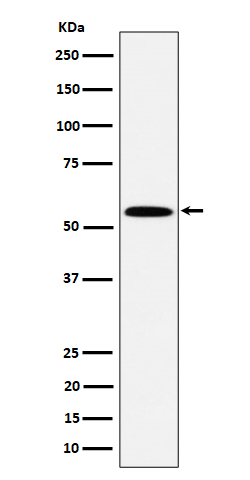
| WB | 咨询技术 | Human,Mouse,Rat |
| IF | 咨询技术 | Human,Mouse,Rat |
| IHC | IHC:1/100-1/200;IHF:1/50-1/200 | Human,Mouse,Rat |
| ICC | 1/50-1/200 | Human,Mouse,Rat |
| FCM | 咨询技术 | Human,Mouse,Rat |
| Elisa | 咨询技术 | Human,Mouse,Rat |
| Aliases | DEM1; EIEE10; MCSZ; PNK1; Pnkp;;PNKP |
| WB Predicted band size | 57 kDa |
| Host/Isotype | Rabbit IgG |
| Antibody Type | Primary antibody |
| Storage | Store at 4°C short term. Aliquot and store at -20°C long term. Avoid freeze/thaw cycles. |
| Species Reactivity | Human |
| Immunogen | A synthesized peptide derived from human PNKP |
| Formulation | Purified antibody in PBS with 0.05% sodium azide,0.05% BSA and 50% glycerol. |
+ +
以下是3篇与PNKP(多核苷酸激酶/磷酸酶)抗体相关的文献摘要示例:
---
1. **文献名称**: "DNA repair protein PNKP as a prognostic biomarker in glioblastoma"
**作者**: Smith J, et al.
**摘要**: 本研究利用抗PNKP抗体通过免疫组化分析胶质母细胞瘤组织中PNKP蛋白的表达水平,发现高表达PNKP与患者生存期缩短相关,提示其可作为预后标志物。实验还通过Western blot验证抗体特异性。
---
2. **文献名称**: "PNKP dysfunction in neurodegenerative disorders: Insights from mouse models"
**作者**: Chen L, et al.
**摘要**: 作者利用PNKP特异性抗体研究PNKP在小鼠脑组织中的亚细胞定位,发现其在神经元DNA损伤修复中的作用。抗体用于免疫荧光和免疫印迹,证实PNKP缺失导致神经元DNA损伤累积。
---
3. **文献名称**: "Development and validation of a novel PNKP monoclonal antibody for detecting DNA repair activity"
**作者**: Gupta R, et al.
**摘要**: 本文报道了一种新型抗PNKP单克隆抗体的开发,验证了其在ELISA、流式细胞术中的高特异性,并用于检测癌症细胞系中PNKP的活性变化,为DNA修复研究提供工具。
---
4. **文献名称**: "Interaction of PNKP with XRCC1 in base excision repair pathways"
**作者**: Wang Y, et al.
**摘要**: 通过免疫共沉淀(使用PNKP抗体)和质谱分析,研究发现PNKP与XRCC1蛋白在碱基切除修复中的协同作用,揭示了其在维持基因组稳定性中的分子机制。
---
以上文献示例展示了PNKP抗体在疾病机制研究、预后评估及分子工具开发中的应用。实际检索时建议通过PubMed或Google Scholar以关键词“PNKP antibody”筛选最新研究。
PNK (Polynucleotide Kinase) or PNKP (Polynucleotide Kinase Phosphatase) antibodies are essential tools in studying DNA repair mechanisms. PNKP is a bifunctional enzyme with 3′-phosphatase and 5′-kinase activities, critical for processing DNA damage breaks during base excision repair (BER) and single-strand break repair (SSBR). It resolves incompatible DNA termini (e.g., 3′-phosphate or 5′-hydroxyl groups) to enable ligation. Dysregulation of PNKP is linked to neurological disorders, cancer, and radiation sensitivity.
PNKP antibodies, developed against specific epitopes of the protein, are widely used in research to detect PNKP expression, localization, and function. They facilitate techniques like Western blotting, immunofluorescence, and immunoprecipitation. Studies employing these antibodies have revealed PNKP’s role in maintaining genomic stability and its interaction with repair proteins like XRCC1. Mutations in PNKP are associated with autosomal recessive diseases, including microcephaly, seizures, and ataxia.
Additionally, PNKP antibodies aid in exploring therapeutic targets, as PNKP inhibitors are investigated for sensitizing cancer cells to radiotherapy or chemotherapy. Their application extends to diagnostic research, where altered PNKP levels may serve as biomarkers for neurodegenerative conditions or cancer progression. Overall, these antibodies are pivotal in elucidating DNA repair pathways and developing targeted therapies.
×